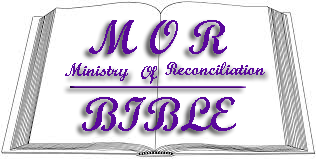|
November 2021 Printable 171 KB .pdf MOR-Bible,
which is in God the Father and the Lord Jesus Christ, peace to you
and grace, from God our Father, and the Lord Jesus Christ. We exhort
that supplications, prayers, intercessions, and giving of thanks
be made for all people and for all that are in authority, that we,
the born-again believers, may lead a quiet and peaceable life in
all godliness and honesty. For this is good and acceptable in the
sight of God our Savior who will have all people to be saved, and
to come to the knowledge of the truth (1 Timothy 2:1-4). In the
name of our Lord Jesus Christ, Amen.
Philippians
is one of the seven Church Epistles (i.e., Romans, Corinthians,
Galatians, Ephesians, Philippians, Colossians, and Thessalonians).
It is written to the administration of grace in which we now live.
It corrects practical errors for not obeying the doctrine Epistle
of Ephesians. 2 Timothy
3:16 tells us:
The focus of this month's teaching is on Philippians 4:6: Be careful for nothing, but in everything by prayer and supplication with thanksgiving let your requests be made known unto God. Finis
Jennings Dake's Annotated Reference Bible has a wonderful
illumination about Philippians 4:6. I want to share it with you.
It states, "Do not tolerate anxiety or worry, for it will injure
your own souls. God alone can help you and He will do it if you
pray about everything that happens and give thanks."
In
the world today, it's easy to get anxious and distracted from God's
Word with what is currently going on! You may get anxious about
your life, anxious about what you will eat, or what you will drink;
anxious about your body, or what you will wear. Or you may be anxious
about where you are going to live, anxious about your health, anxious
about your job, or anxious about getting sick and dying.
I thank
God our Father for supplying all our needs according to His riches
in glory by Christ Jesus, the now glorified one who was once humbled!
The
next usage of the Greek word merimnao is in Matthew 6:34:
We
are instructed in this verse to focus our thoughts on God's Word
here and now. We are to live one day at a time. There is enough
evil going on right now! We are not anxious or distracted about
the cares of tomorrow as they will take care of themselves.
Sometimes
in this world we are anxious or distracted or confused by the disorder,
noises and cares in our minds that we do not hear God's Word! We
are to calm our minds and not be anxious or distracted.
In
this verse, Paul was anxious to know if the Philippi believers were
still living the Word of God that he had taught them. So, he sent
Timothy, a fellow like-minded believer, to care for them. Paul wanted
to know that he had not labored in vain teaching them God's Word.
Why? The answer is in verse 21 below.
Doesn't
this sound like the world we are currently living in today? Most
people in this world are concerned about themselves, not the things
which are of Jesus Christ, the humbled one now glorified! The
next word we will review is our English word "nothing"
which is translated from the Greek word medeis which means
"not anyone. Not one thing, none at all, not even one."
Let's read four usages of the Greek word medeis used in the
Bible translated into our English word "nothing." Again,
I exhort you to please read the context of these usages to increase
your understanding. I will select four verses using medeis
from the seven Church Epistles (i.e., Romans, Corinthians, Galatians,
Ephesians, Philippians, Colossians, and Thessalonians) that are
addressed to us!
Philippians
1:28:
Philippians
2:3:
1 Thessalonians
4:12:
These
verses tell us that we, the believers of God's Word, are always
rejoicing; we are not terrified by our adversaries; not even one.
We don't do anything through strife or vain glory but act in lowliness
of mind and to esteem others better than ourselves (Philippians
2:3). The purpose of these actions is so that we may walk honestly,
elegant in the figure, demeanor, and bearing; and graceful toward
them that are outside the body of Christ, and that we may have lack
of not even one thing (1 Thessalonians 4:12)! We are not to be anxious
or distracted by the cares of this world! The
next word we will review is our English word "prayer"
which is translated from the Greek word proseuche which means
"to speak out to, prayer towards (restricted to prayer to God,
and marking the power of Him, whom we invoke)." Now let's read
four usages of the Greek word proseuche translated into our
English word "prayer." I exhort you to please read the
context of these usages to increase your understanding.
Ephesians
6:18:
Colossians
4:12:
1 Thessalonians
1:2:
We
pray to God always for one another that we will stand mature and
complete in all His Will which is His Word! We give thanks to God
always for one another, by praying in the spirit and with our understanding.
The
next word we will review is our English word "supplication"
which is translated from the Greek word de-eesis which means
"to want, need; then prayer, as the expression of need, supplication."
In other words, de-eesis or supplication means a specific
want or need in prayer to God our Father, documented in His Word. Now let's read the four usages of the Greek word de-eesis translated into our English word "supplication." I exhort you to please read the context of these usages for better understanding. Acts
1:14:
Ephesians
6:18:
Philippians
4:6:
1 Timothy
2:1:
These
verses remind us that we are to pray in one accord with one another
for specific needs as documented in God's Word. We are to give thanks
to God our Father for meeting those specific needs (de-eesis)
of the body of Christ for all born-again believers! The
next word we will review is our English word "thanksgiving"
which is translated from the Greek word ukaristia which means
"thankfulness, gratitude, a giving of thanks." Let's read
four usages of the Greek word ukaristia translated into our
English word "thanksgiving." I exhort you to please read
the context of these usages to increase your understanding. 2 Corinthians
4:15:
2 Corinthians
9:12:
Colossians
2:7:
Colossians
4:2:
Ukaristia
reminds us that in prayer we are to be always grateful and give
abundant thanks to God our Father for His Word, His son, and each
other!
Philippians
4:6:
1 John
5:15:
As
we pray to God our Father in accordance with His Word, we know He
hears us, and we have received the specific thing asked for or object
sought that we desired of Him! Acts
2:28:
Romans
9:23:
Ephesians
1:9:
Colossians
1:27:
God
our Father by His Word has made known to us the ways of life, the
riches of His glory, the mystery of His Will, which is Christ in
you, the hope of glory!
Now
let's read four usages of the Greek word Theos translated
from our English word "God." I exhort you to please read
the context of these usages to increase your understanding.
Ephesians
2:8:
Ephesians
4:6:
1 Thessalonians
2:4:
We,
the born-again believers, are not ashamed of the gospel of Christ
as it is the power of God to salvation and wholeness to everyone
that believes (Romans 1:16). We know by the Word of God, that by
grace, we were saved through the believing of Jesus Christ and that
it is the gift of God (Ephesians 2:8)! We know there is one God
and Father of all, who is above all, and through all, and in us
all (Ephesians 4:6)! Therefore, we are to speak, not as pleasing
men, but God, which proves our hearts (1 Thessalonians 2:4)!
We must always do the Will of God which is His Word! No matter the circumstances we face in this world, we must consistently live and share God's Word! And when we, the believers, do that look at what we receive! Philippians
4:7:
In
this month's teaching, we reviewed in Philippians 4:6 the following
English words and phrases:
By
understanding these words and phrases and their corresponding Greek
definitions, we can open our understanding of God's Word! In turn,
we can increase our believing! We are continually comforted and
strengthened by God's Word! Next
month's teaching will be "Workers together with the one true
God." In
the Lord, |
|
© 2016-2022MOR-BIBLE contactus@mor-bible.com

